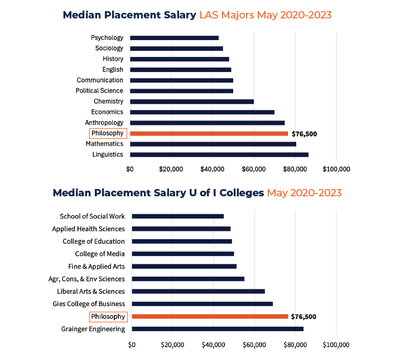Philosophy majors at the University of Illinois tend to do very well by many objective metrics - e.g., employment, salary, and graduate and professional school admissions.
Strong First Destination Results. The most recent Illinois Success Survey data reports that within six months of graduation, 57% of Illinois students who graduate with a B.A. in philosophy are pursuing additional education and 42% have started a job.
High Beginning Salaries. The Illini Success survey reports a median salary for these graduates of $76,500.

High Mid-Career Salaries. The University of Illinois does not collect mid-career salary data. But Payscale.com once released relevant national data concerning mid-career salaries (15.5 years after graduation) of college graduates by major. Unlike our data, the graph below splits between STEM and non-STEM categories, but it still suggests philosophy majors continue to have excellent comparative earning potential.

Of the top 50 overall fields, philosophy ranked sixteenth overall, with seven of the majors above it being in various engineering fields. There is also some indication that Philosophy majors do better over time. For example, in this dataset, the starting median salary for Business Administration majors was $43,000, higher than the starting median salary for Philosophy majors. But as the graph above shows, by mid-career, Philosophy majors were doing significantly better than Business Administration majors.
Broad Graduate School Success. Many undergraduates want to know where philosophy majors go after graduation. The majority of our graduates (51%) go into continuing education, with the largest percentages going to law school (JDs), graduate programs (PhDs), masters programs (MAs) or other professional degrees. The graduate programs they go into are surprisingly diverse, in part because philosophy is itself such a broad field, which can prepare you for many different graduate programs. Here are two graphs with some relevant data from August 2014 to May 2021:
| DEGREE SOUGHT | % RESPONDENTS |
|---|---|
| Juris Doctor (JD) | 23.1% |
| Doctor of Philosophy (PhD) | 20.5% |
| Master of Arts (MA) | 17.9% |
| Professional Degree | 10.3% |
| Certificate | 7.7% |
| Master of Science (MS) | 5.1% |
| Doctoral Degree | 2.6% |
| Graduate Degree | 2.6% |
| Master Degree | 2.6% |
| Master of Business Administration (MBA) | 2.6% |
| Master of Philosophy (MPhil) | 2.6% |
| Other | 2.6% |
| PROGRAM / MAJOR | # RESPONDENTS |
|---|---|
| Law | 10+ |
| Philosophy | 5+ |
| Accounting | 1+ |
| Business Administration and Management | 1+ |
| Chemistry | 1+ |
| Civil Engineering | 1+ |
| Clinical Psychology | 1+ |
| Computer Science | 1+ |
| Developmental Psychology | 1+ |
| Elementary Education Teacher Licensure Program | 1+ |
| Finance | 1+ |
| Human Resources and Industrial Relations | 1+ |
| Interdisciplinary Studies | 1+ |
| Mathematics | 1+ |
| Music Theory and Composition | 1+ |
| Philosophy/Political Theory | 1+ |
| Physics | 1+ |
| Public Administration | 1+ |
| Religious Studies | 1+ |
| Sports Management | 1+ |
| Statistics | 1+ |
| Sustainable Design | 1+ |
Broad Career Choices. For graduating philosophy majors who decide to go directly into employment, data suggests that they go into a surprising range of careers. We think this is in part because philosophy teaches you to think better in ways that can apply to many vocations. The department thus holds workshops each semester on how to communicate with employers and explain precisely how a philosophy degree prepares you for the job skills that most modern employers value most — like problem-solving, communication, open-mindedness, a strong work ethic, adaptability, self-management, teamwork, leadership, and technological skills. Here is a list of some of the positions that some recent graduating philosophy majors have started their careers in:
| POSITION TITLE | # RESPONDENTS |
|---|---|
| Associate Consultant | 1+ |
| Business Development Representative | 1+ |
| Conflicts Analyst | 1+ |
| Consultant | 1+ |
| Data Analyst | 1+ |
| Engineering Pathways Program Intern | 1+ |
| Financial Analyst | 1+ |
| Freelance Web Designer | 1+ |
| General Law Legal Support | 1+ |
| Intern | 1+ |
| Intramural Sports Graduate Assistant | 1+ |
| Junior Software Engineer | 1+ |
| Lock And Dam Operator | 1+ |
| Management Consulting Analyst | 1+ |
| Manager | 1+ |
| Missionary | 1+ |
| Mt | 1+ |
| Packaging Specialist | 1+ |
| Paralegal | 1+ |
| Research Assistant | 1+ |
| Sales Associate | 1+ |
| Sales Person | 1+ |
| Screening Coordinator | 1+ |
| Secondary School Math Teacher | 1+ |
| Server/Bartender | 1+ |
| Software Developer | 1+ |
| Software Engineer | 1+ |
| Software Engineer Associate | 1+ |
| Teacher | 1+ |
| Teaching Assistant | 1+ |
| Technical Solutions Engineer | 1+ |
| Technician I | 1+ |
| Total respondents for this question | 32 |